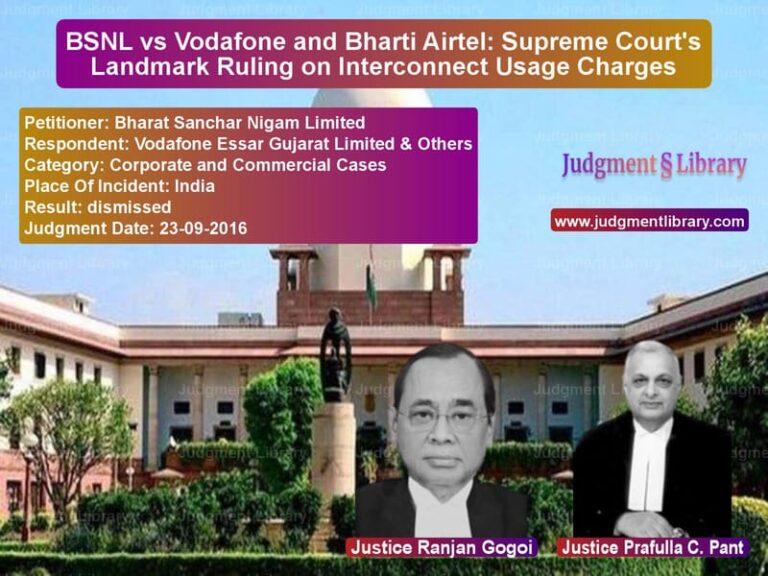Promotion Denied Due to Pending Investigation: Supreme Court Rules in Favor of Officer
The Supreme Court of India, in the case of Union of India & Ors. v. Doly Loyi, delivered a crucial judgment regarding the denial of promotion to a government officer on the grounds of pending prosecution. The Court ruled that mere sanction for prosecution does not constitute a pending criminal charge, and therefore, the officer’s promotion could not be withheld using the sealed cover procedure.
Background of the Case
Doly Loyi, the respondent, was appointed as an Assistant Commissioner of Income Tax on December 16, 1987. Over the years, he was promoted to various positions, including Deputy Commissioner, Joint Commissioner, and Additional Commissioner of Income Tax. However, his promotion to the position of Commissioner of Income Tax was withheld due to an FIR filed against him in December 2001. The FIR alleged criminal misconduct under the Prevention of Corruption Act, 1988, for acts committed while serving as Special Secretary (Finance) in the Government of Arunachal Pradesh.
Despite his eligibility, the Departmental Promotion Committee (DPC) in 2007 decided to withhold his promotion based on the pending sanction for prosecution. The respondent challenged this decision before the Central Administrative Tribunal (CAT), which ruled in his favor. The Union of India, however, appealed against this decision, leading to a series of legal battles culminating in the Supreme Court’s ruling.
Legal Proceedings and Arguments
Union of India’s Arguments
- The government contended that as per the Office Memorandum (OM) dated September 14, 1992, a government servant facing prosecution should not be promoted.
- They argued that once a sanction for prosecution is granted, the officer is considered under prosecution, even if the charge sheet has not yet been filed.
- The government relied on the Central Civil Services (Pension) Rules, 1972, which define judicial proceedings as beginning when a complaint or police report is filed.
Respondent’s Arguments
- The respondent contended that on the date of the DPC meeting, there was no pending prosecution as no charge sheet had been filed.
- He argued that the 1992 OM does not cover cases where only a sanction for prosecution exists but no formal proceedings have commenced.
- He highlighted that an earlier OM from 1988 included sanction for prosecution as a ground for sealed cover procedure, but this clause was omitted in the 1992 OM.
Supreme Court’s Observations
The Court, led by Justice Sandeep Mehta, made the following observations:
“The disciplinary/criminal proceedings can be said to be initiated against the employee only when a charge memo is issued in a disciplinary proceeding or a charge sheet for a criminal prosecution is filed in the competent Court. The sealed cover procedure is to be resorted to only after issuance of the charge-memo/charge-sheet. The pendency of investigation and grant of prosecution sanction will not be sufficient to enable the authorities to adopt the sealed cover procedure.”
The Court also referred to the precedent set in Union of India v. K.V. Jankiraman (1991), which held that sealed cover procedures apply only after formal charges are framed.
Key Findings and Judgment
- The Supreme Court ruled that mere sanction for prosecution does not constitute pending criminal proceedings.
- The Court found that the DPC’s decision to withhold the respondent’s promotion was unjustified.
- The sealed cover was opened in court, revealing that the respondent had been found ‘FIT’ for promotion by the DPC.
- The Court ordered that the respondent be promoted and awarded back wages.
Implications of the Judgment
This ruling has significant implications for government servants facing delayed or pending investigations:
- Clarification of Promotion Rules: The judgment reinforces that promotions cannot be withheld merely on the basis of a pending investigation.
- Preventing Misuse of Sealed Cover Procedure: The decision ensures that the government does not arbitrarily withhold promotions without a formal charge sheet.
- Protection of Employee Rights: The ruling safeguards government employees from undue career stagnation due to prolonged investigations.
Conclusion
The Supreme Court’s decision in Union of India & Ors. v. Doly Loyi is a landmark ruling that upholds the principles of fairness and due process in government promotions. By emphasizing that only formal charges can trigger the sealed cover procedure, the Court has ensured that employees are not unfairly deprived of career advancements due to administrative delays.
Petitioner Name: Union of India & Ors..Respondent Name: Doly Loyi.Judgment By: Justice Sandeep Mehta, Justice R. Mahadevan.Place Of Incident: Arunachal Pradesh.Judgment Date: 24-09-2024.
Don’t miss out on the full details! Download the complete judgment in PDF format below and gain valuable insights instantly!
Download Judgment: union-of-india-&-ors-vs-doly-loyi-supreme-court-of-india-judgment-dated-24-09-2024.pdf
Directly Download Judgment: Directly download this Judgment
See all petitions in Promotion Cases
See all petitions in Disciplinary Proceedings
See all petitions in Public Sector Employees
See all petitions in Judgment by Sandeep Mehta
See all petitions in Judgment by R. Mahadevan
See all petitions in dismissed
See all petitions in Quashed
See all petitions in supreme court of India judgments September 2024
See all petitions in 2024 judgments
See all posts in Service Matters Category
See all allowed petitions in Service Matters Category
See all Dismissed petitions in Service Matters Category
See all partially allowed petitions in Service Matters Category







